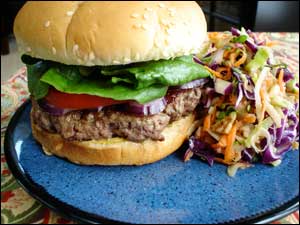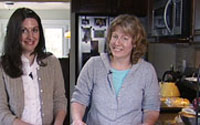Published: January 27, 2009. Part 1: Let’s face it, our dirty little secret—eating whole foods, eating locally or eating organic, sustainable, non-local is a very real class issue today. What you eat is directly related to how much money you make, how much time you have to source or grow food, your comfort level in cooking and your level of education to know what is “good” for you. We need to at least acknowledge this inescapable fact in the sustainable food movement. The choices we so confidently espouse for the health of humanity and the planet are not made easily by a huge segment of the population, particularly in this economic downturn.
Eating responsibly has many different faces, which is what I think Mark Bittman was recently getting at with his broccoli/hamburger example. He makes the very valid point that for large scale change to occur, it must first happen at the lowest common denominator—the supermarket. The average person must make that basic choice of a fresh vegetable or grain/legume staple over processed food. It seems easy, right? Just eat the broccoli, lady. But, even taking that most basic, seemingly mindless step isn’t as easy as it seems.
In the minimalist philosophy, a few ingredients and basic cooking skills are all that is needed to produce delicious meals. This is absolutely correct and desirable, yet still assumes you know how to chop, sauté, boil, bake, shop wisely, follow recipe instructions reasonably well, and then, have the time to do the dishes in your minimally equipped kitchen. It also assumes a ready and willing audience for the healthy food you produce. This is simply not true for a big segment of the population. Am I wrong here? Do other people out there have stories, data that would indicate otherwise? Stepping out beyond our charmed lives?
With sufficient time, a reasonably high level of cooking skill, maybe a kitchen garden, utilizing the farmer’s market and other local food sources, yes, it is possible for urban dwellers to both eat responsibly and to eat very well. This is TwoJune’s situation—but, to be honest, it takes a lot of time, is expensive, and is only accomplished without too much difficulty because there are two of us, we both cook professionally, one of us works from home and the other has a 9-to-5 professional career. And we don’t even have a child—yet.
Next Tuesday, Part 2: we examine the very real difficulties encountered by the working poor, particularly single parents, in preparing simple, home-cooked meals.
Lisa Bell is a freelance producer, writer and editor. She spent the first fifteen years of her working life as a pastry chef, recipe developer, test kitchen director, food stylist and print editor. She has also taught cooking classes, run a small cooking school, and worked as a food scientist. Nicole Rees currently works as a baking scientist. She is also a food writer and cookbook author specializing in baking science. Her most recent book Baking Unplugged, is filled with simple, scratch recipes that require no electric gadgets beyond an oven.


